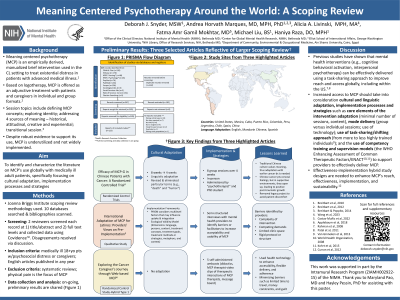Systems-Based Practice and Administrative Psychiatry
Session: Poster Session
(183) Meaning Centered Psychotherapy: A Scoping Review of Adaptations Around the World

Trainee Involvement: No
.jpg)
Deborah Snyder, MSW, LCSW-C, ACC
Faculty, NIH/NIMHPsychiatry Consultation Liaison Service
National Institute of Mental Health
Bethesda, Maryland, United States- AH
Andrea Horvath Marques, MD, MPH, PhD
Medical Officer
National Institute of Mental Health
Bethesda, Maryland, United States - AL
Alicia Livinsk, MPH, MLS
Biomedical Librarian
National Institutes of Health Library
Bethesda, Maryland, United States 
Haniya Raza, DO
Chief, Psychiatry Consultation Liaison Service
National Institute of Mental Health
Bethesda, Maryland, United States
Presenting Author(s)
Co-Author(s)
The purpose of this scoping review is to find and characterize the existing literature regarding MCP globally, specifically around cultural adaptation and implementation processes (e.g., numbers of sessions, provider specialist of sessions). Conclusion/Implications: MCP offers a vehicle for cancer and patients with other medical illness to incorporate meaning and spirituality in their lives. It is an important piece of the whole person care in cancer therapy. Findings from this scoping review can better guide the field on the adaptation and implementation of MCP within the United States, abroad across different cultures and countries. Implications will include consideration of the use of a task-sharing approach (e.g, entails the shifting of tasks, typically from more to less highly trained individuals) to enhance access to MCP. Training and supervision, such as the use of competency-based approaches might be considered to support skills for non‐specialist and specialist providers across cultures and contexts to effectively deliver MCP interventions. Breitbart et al., 2012. Pilot randomized controlled trial of individual meaning-centered psychotherapy for patients with advanced cancer. Journal Clinical Oncology. WHO, 2022. World mental health report: transforming mental health for all. Geneva: World Health Organization; 2022. License: CC BY-NC-SA 3.0 IGO. Costas-Muniz et al., 2022. Meaning-Centered Psychotherapy for Latino Patients with Advanced Cancer: Cultural Adaptation Process. Journal of Palliative Medicine. Kohrt et.al, 2020. Ensuring Quality in Psychological Support (WHO EQUIP): developing a competent global workforce. World Psychiatry.
Background: Pioneered by Breitbart and colleagues, meaning-centered psychotherapy (MCP) is an empirically derived, manualized, brief, structured intervention provided by trained clinicians to help patients suffering with loss of meaning around medical illness, originally developed for use in psycho-oncology. MCP has been culturally and linguistically adapted across populations. However, given the dearth of specialist mental health providers, there remain countless patients with lack of access to this intervention.
Methods: We will use the Joanna Briggs Institute methodology to conduct the scoping review. We will search five databases that cover the biomedical, nursing and allied health, and psychiatry and psychology fields: CINAHL Plus, Embase, PsycNet, PubMed, and Scopus. Two reviewers will screen all records by title/abstract and full text and collect data in duplicate from each article using Covidence. Inclusion criteria consist of: MCP interventions for adult (18+) medical illness patients or caregivers with psychosocial distress (e.g., depression, anxiety, despair, stress) in any language, year, and study design.
Results: Descriptive statistics will be presented on type of medical diagnoses, MCP adaptation, mode of delivery, language, country of study, sample sizes, psychosocial distress, effectiveness, and implementation outcomes.
References:

